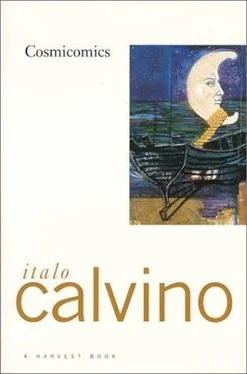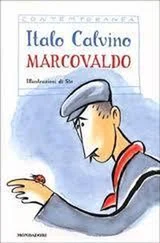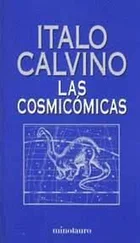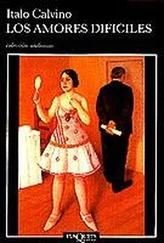Like me, when I was clinging to that rock, you mean? – Qfwfq asked, - With the waves rising and falling, and me there, still, flat, sucking what there was to suck and thinking about it all the time? If that's the time you want to know about, there isn't much I can tell you. Form? I didn't have any; that is, I didn't know I had one, or rather I didn't know you could have one. I grew more or less on all sides, at random; if this is what you call radial symmetry, I suppose I had radial symmetry, but to tell you the truth I never paid any attention to it. Why should I have grown more on one side than on the other? I had no eyes, no head, no part of the body that was different from any other part; now I try to persuade myself that the two holes I had were a mouth and an anus, and that I therefore already had my bilateral symmetry, just like the trilobites and the rest of you, but in my memory I really can't tell those holes apart, I passed stuff from whatever side I felt like, inside or outside was the same, differences and repugnances came along much later. Every now and then I was seized by fantasies, that's true; for example, the notion of scratching my armpit, or crossing my legs, or once even of growing a mustache. I use these words here with you, to make myself clear; then there were many details I couldn't foresee: I had some cells, one more or less the same as another, and they all did more or less the same job. But since I had no form I could feel all possible forms in myself, and all actions and expressions and possibilities of making noises, even rude ones. In short, there were no limitations to my thoughts, which weren't thoughts, after all, because I had no brain to think them; every cell on its own thought every thinkable thing all at once, not through images, since we had no images of any kind at our disposal, but simply in that indeterminate way of feeling oneself there, which did not prevent us from feeling ourselves equally there in some other way.
It was a rich and free and contented condition, my condition at that time, quite the contrary of what you might think. I was a bachelor (our system of reproduction in those days didn't require even temporary couplings), healthy, without too many ambitions. When you're young, all evolution lies before you, every road is open to you, and at the same time you can enjoy the fact of being there on the rock, flat mollusk-pulp, damp and happy. If you compare yourself with the limitations that came afterwards, if you think of how having one form excludes other forms, of the monotonous routine where you finally feel trapped, well, I don't mind saying life was beautiful in those days.
To be sure, I lived a bit withdrawn into myself, that's true, no comparison with our interrelated life nowadays; and I'll also admit that – partly because of my age and partly under the influence of my surroundings – I was what they call a narcissist to a slight extent; I mean I stayed there observing myself all the time, I saw all my good points and all my defects, and I liked myself for the former and for the latter; I had no terms of comparison, you must remember that, too.
But I wasn't so backward that I didn't know something else existed beyond me: the rock where I clung, obviously, and also the water that reached me with every wave, but other stuff, too, farther on: that is, the world. The water was a source of information, reliable and precise: it brought me edible substances which I absorbed through all my surface, and other inedible ones which still helped me form an idea of what there was around. The system worked like this: a wave would come, and I, still sticking to the rock, would raise myself up a little bit, imperceptibly – all I had to do was loosen the pressure slightly – and, splat, the water passed beneath me, full of substances and sensations and stimuli. You never knew how those stimuli were going to turn out, sometimes a tickling that made you die laughing, other times a shudder, a burning, an itch; so it was a constant seesaw of amusement and emotion. But you mustn't think I just lay there passively, dumbly accepting everything that came: after a while I had acquired some experience and I was quick to analyze what sort of stuff was arriving and to decide how I should behave, to make the best use of it or to avoid the more unpleasant consequences. It was all a kind of game of contractions, with each of the cells I had, or of relaxing at the right moment: and I could make my choices, reject, attract, even spit.
And so I learned that there were the others, the element surrounding me was filled with traces of them, others hostile and different from me or else disgustingly similar. No, now I'm giving you a disagreeable idea of my character, which is all wrong. Naturally, each of us went about on his own business, but the presence of the others reassured me, created an inhabited zone around me, freed me from the fear of being an alarming exception, which I would have been if the fact of existing had been my fate alone, a kind of exile.
So I knew that some of the others were female. The water transmitted a special vibration, a kind of brrrum brrrum brrrum, I remember when I became aware of it the first time, or rather, not the first, I remember when I became aware of being aware of it as a thing I had always known. At the discovery of these vibrations' existence, I was seized with a great curiosity, not so much to see them, or to be seen by them either – since, first, we hadn't any sight, and secondly, the sexes weren't yet differentiated, each individual was identical with every other individual and at looking at one or another I would have felt no more pleasure than in looking at myself – but a curiosity to know whether something would happen between me and them. A desperation filled me, a desire not to do anything special, which would have been out of place, knowing that there was nothing special to do, or nonspecial either, but to respond in some way to that vibration with a corresponding vibration, or rather, with a personal vibration of my own, because, sure enough, there was something there that wasn't exactly the same as the other, I mean now you might say it came from hormones, but for me it was very beautiful.
So then, one of them, shlup shlup shlup, emitted her eggs, and I, shlup shlup shlup, fertilized them: all down inside the sea, mingling in the water tepid from the sun; oh, I forgot to tell you, I could feel the sun, which warmed the sea and heated the rock.
One of them, I said. Because, among all those female messages that the sea slammed against me like an indistinct soup at first where everything was all right with me and I grubbed about paying no attention to what one was like or another, suddenly I understood what corresponded best to my tastes, tastes which I hadn't known before that moment, of course. In other words, I had fallen in love. What I mean is: I had begun to recognize, to isolate the signs of one of those from the others, in fact I waited for these signs I had begun to recognize, I sought them, responded to those signs I awaited with other signs I made myself, or rather it was I who aroused them, these signs from her, which I answered with other signs of my own, I mean I was in love with her and she with me, so what more could I want from life?
Now habits have changed, and it already seems inconceivable to you that one could love a female like that, without having spent any time with her. And yet, through that unmistakable part of her still in solution in the sea water, which the waves placed at my disposal, I received a quantity of information about her, more than you can imagine: not the superficial, generic information you get now, seeing and smelling and touching and hearing a voice, but essential information, which I could then develop at length in my imagination. I could think of her with minute precision, thinking not so much of how she was made, which would have been a banal and vulgar way of thinking of her, but of how from her present formlessness she would be transformed into one of the infinite possible forms, still remaining herself, however. I didn't imagine the forms that she might assume, but I imagined the special quality that, in taking them, she would give to those forms.
Читать дальше












